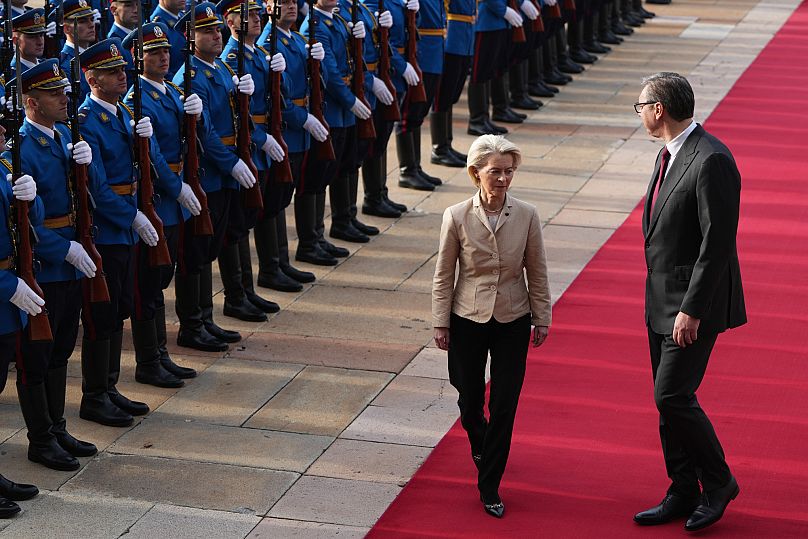European Commission President Ursula von der Leyen visited Serbia on Wednesday, marking the fourth stop — after Albania, Montenegro and Bosnia and Herzegovina — of her tour across the Western Balkans to discuss EU enlargement with regional leaders.
On Wednesday, von der Leyen met with Serbian President Aleksandar Vučić in Belgrade, where the two held a joint press conference.
"Nearly two decades ago, Serbia made the choice to join the EU — not as a strategic calculation, but as the heartfelt wish of the Serbian people,” von der Leyen said.
Today Brussels expects Serbia to move twice as fast on its path toward full-fledged membership, von der Leyen added.
“We live in a fragmented world where the gap between democracies and autocracies is widening," the Commission chief said.
"You know the EU’s position — our stance is for freedom, not repression, including the right to peaceful assembly. We stand for partnership instead of domination, and diplomacy instead of aggression."
Von der Leyen further welcomed progress on voter registries and the appointment of the media regulator (REM) Council, acknowledging the efforts of civil society and the opposition.
“This is a good first step,” she said, adding that implementation of reforms that will bring Serbia closer to the EU is crucial and inviting Vučić to Brussels “in a month’s time so that we can jointly assess the situation.”
Von der Leyen also noted that Serbia needs to achieve a higher level of alignment with the EU’s foreign policy, including sanctions against Russia.
“I must commend you, Serbia is already 61% aligned with our foreign policy, but more is needed. We must be able to count on Serbia as a reliable partner,” she said.
'Everyone must be involved'
Answering a question about ongoing student-led protests, nearing their one-year mark, von der Leyen said that this is a crucial moment for Serbia and a time for the entire nation to come together.
“This is the moment to strengthen the foundations of a strong, vibrant, and effective democracy. I want to assure you that the EU stands ready to support you and invest every effort in this regard," von der Leyen said.
"The entire accession process is about that, reforms that bring society along. Everyone must be involved,” she added.
She explained that the government’s cooperation with civil society has created a platform for media and electoral reform, enabling further progress and consensus on key issues.
“That’s an important example and a good step forward for future reforms. Now it’s essential to see concrete change on the ground,” she stated.

Vučić also addressed the ongoing protests, sparked by a deadly train station awning collapse that killed 16 in November 2024. The demonstrators gathering across Serbia have called for various political and economic reforms, drawing significant attention both domestically and internationally.
“This is a country that is a world champion in freedom of assembly, because we've had over 25,000 criminal or illegal, unregistered gatherings that we protected, secured, and took care of the people who organised them illegally. Just to set the record straight,” Vučić said.
He added that allegations of excessive police force are unfounded.
“And when you talk about police response and the 'excessive use of force,' or however you want to call it—if that ever happened, it happened least of all in Serbia. The police only reacted in cases of absolute necessity and with minimal use of force."
Next stop Kosovo
After a stop in Belgrade on Wednesday, von der Leyen travelled to Kosovo, where she met with its leaders in the capital Pristina.
Kosovo President Vjosa Osmani said the country is ready to move forward with reforms and a strong commitment to a European future following her meeting with European Commission President Ursula von der Leyen.
“It is a particular pleasure to once again welcome President Ursula von der Leyen to Kosovo today," Osmani said in a Facebook post on Wednesday.
"Together, we discussed the implementation of the Growth Plan, the importance of lifting the unfair measures against our country, as well as the next steps on our path toward EU integration," she added.
"The support of the European Commission for Kosovo in this process remains essential."
The EU maintains restrictive measures imposed in June 2023, introduced in response to the Kosovo government’s actions, which caused, according to Brussels, rising tensions with the ethnic Serb community in the country’s northern part.
Von der Leyen also met with caretaker Prime Minister Albin Kurti but made no public statements as she concluded her visit to Kosovo, with North Macedonia her next and final stop on the regional tour.
Von der Leyen fetes Bosnia and Montenegro's progress
During her visit to Bosnia in Sarajevo on Tuesday, von der Leyen met with the head of the state-level Council of Ministers Borjana Krišto, to emphasise the progress the Western Balkan country has made on its path toward EU membership.
Von der Leyen underlined that Bosnia “has come a long way” and now “stands on the threshold of the European Union.”
Two years ago, the EU launched a €6 billion fund for the Western Balkans, the Reform and Growth Facility, to financially support the six from 2024 to 2027 on their path to EU membership.
The funding is intended to progressively integrate the region with EU regulations, especially regarding rule of law.
The growth plan should open the door to €1 billion in investments in Bosnia, but these have been put on hold due to a lack of progress on the expected reforms.
Now, the priority is to hold an intergovernmental conference, and to do that, it is necessary to adopt judicial reform laws, the European Commission chief emphasised.
On Tuesday morning, the President of the Commission was in Montenegro, where she described the Adriatic country as a "leader in European integration", emphasising that Montenegro could close five negotiation chapters by the end of the year. Montenegro has already provisionally closed seven of the 33 chapters.







